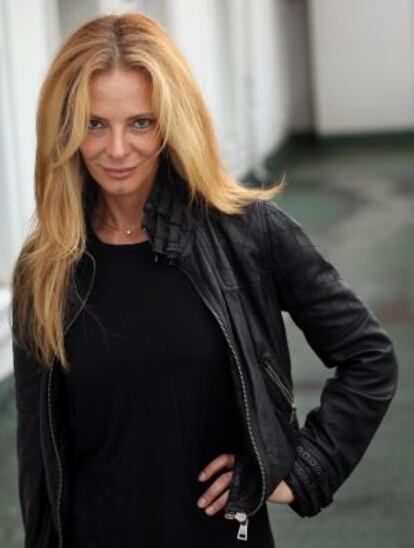Telephones and trending topics
TV presenter Paula Vázquez caused a storm on Twitter last week She inadvertently posted her phone number, date of birth and address

"Do you know the book Bad Karma by David Safier?" asks Paula Vázquez, sitting at a table at a sidewalk café. "It's about a TV host who pays for the bad karma of an infidelity with a series of misfortunes, and ends up being squashed to death by a falling sink from a Russian space station. Well, I had one of those days. I'd just returned after driving across Senegal and Spain for work purposes. First I found out that Mariano Pérez, of the Marqués de Vizhoja winery, had died, and I had to go to the burial because I am the face of the brand for the next 10 years. So we go to the airport, get into the car, and during the last few kilometers of the ride we get hit by the car behind us. I end up with a neck sprain. I tweeted the picture of the doctor's report - without showing the treatment, see how I'm not stupid? - and I don't know what happened. Look, see? The photograph on my cellphone ends here in this little corner where the phone number begins. I don't know which application I used to upload it on Twitter, but the number showed up there. I don't care about the date of birth, OK? A minute later some friends warned me that I'd tweeted my telephone number. I was receiving 10, 12 calls a minute, always from the same numbers. So I deleted the tweet and went to the funeral Mass. The calls wouldn't stop. Three thousand in a day. I flew back to Madrid, really pissed. Anyone who is that angry should get on a plane, because you have no option but to get mad and then deal with it. By the time we landed I was looking at it differently. If there was nothing I could do about it, why worry? I took a taxi feeling calmer."
The Galician television host did not have a good day, but the rest of her week was outstanding. This litany of misfortunes, which she also recounted on Twitter, created a something of a mini-storm on the internet. Eventually the problem worked itself out, thanks mostly to Vázquez's ability to not take herself too seriously. She retweeted screen-grabs of the phone numbers of the people calling her, as well as a list of the texts she was receiving via messaging service WhatsApp (one message, which simply said "Would you like some salami? became a trending topic all of its own).
Her handling of the situation revealed a sense of humor that is sorely lacking among most of Spain's celebrities. Essentially, Vázquez came clean about her blunder on the social network - which saw her publish not just her phone number and date of birth, but also her address - laughed at her own predicament, and officially became a kind of surreal protagonist of the week.
Aged 37, Paula Vázquez seems to have been a Spanish celebrity forever. Even in 1993, the year of her debut on the legendary television program Un, dos, tres... at the age of 19, she had already been around for a long time. "A local supermarket ad, a music video... I didn't have a clear beginning. It was all gradual," she recalls.
I was receiving 10, 12 calls a minute, always from the same numbers"
In fact, all her landmark moments have a way of being incredibly mundane. "The moment when I realized that I was going to make a living out of this was the day I bought a shopping cart in Madrid. I was making La vuelta de la fama for Globomedia. I did a live roundup of the cycling race and I was giving away a car live on air. One day, a caller dropped off and so I had to start improvising like crazy. After that I was hired to host No te olvides el cepillo de dientes [or, Don't forget your toothbrush]. And I realized that I couldn't take the shopping cart with me to Barcelona. It was like my anchor in Madrid," she explains, in another one of her soliloquies. "My parents thought that since Un, dos, tres was the best thing that could have happened to me, that I should keep going. I couldn't stop, because they couldn't pay for my upkeep. My father worked at a shipyard until 1983. With the industrial restructuring we had to leave Ferrol to look for work in Barcelona, where he worked as a security guard. My mother was a hairdresser. Those were the days of having rice or popcorn for dinner and having my phone line cut off. I lived alone and I kept working, working. But it was no drama, it was more like, 'Well, I'll make it someday'."
That "I'll make it" mentality, the drive of someone who knows that she risks getting left out of the showbiz world if she holds back, was destined to mark the rest of her career, devoted almost entirely to more than 25 TV programs: from La parodia nacional in 1997, to the lottery program Euromillón, up until 2001, Gran Hermano (Big Brother) in 2002, and La isla de los famosos (or, Celebrity Island) until 2005.
Her inoffensive TV presence turned her into an icon that has remained untouched by passing television trends. "That's because I haven't sold my life story to the gossip magazines and because I have never depended on anybody," she explains. "And because I never took too many risks. I always went for clean, family programs because I see this as a long-distance race."
Eight years ago she moved to Pozuelo, on the outskirts of Madrid, seeking greater privacy. "I found too much of it. I'd like to live right in the city center. I've never got to know Madrid's nightlife. When I was young, I was more interested in having a good voice and not having bags under my eyes in the morning than I was in going out. I never finished [pre-university course] COU either. My brother had a very serious biking accident and fell into a deep coma when he was 16 or 17, and I had to drop my studies and go back to Galicia. That's why I don't like to see children working on television. I can't stand it."
She came clean about her blunder and laughed at her own predicament
This kind of sacrifice also explains the fact that she is still single. "It's hard to meet someone when you're famous. People have prejudices - they know you too much... I've always lived alone. The day I actually live with someone, I don't know how I'm going to do it. To me, the normal thing is for there to be nobody at home. I don't even have a cleaning lady. There's a homebody part of me that I find relaxing. It's not about the money, either. I've done well for myself; I've made investments and saved, and I could retire now if I wanted to. But I can't do anything else. I can't even conceive of my life without all this."
Tu suscripción se está usando en otro dispositivo
¿Quieres añadir otro usuario a tu suscripción?
Si continúas leyendo en este dispositivo, no se podrá leer en el otro.
FlechaTu suscripción se está usando en otro dispositivo y solo puedes acceder a EL PAÍS desde un dispositivo a la vez.
Si quieres compartir tu cuenta, cambia tu suscripción a la modalidad Premium, así podrás añadir otro usuario. Cada uno accederá con su propia cuenta de email, lo que os permitirá personalizar vuestra experiencia en EL PAÍS.
¿Tienes una suscripción de empresa? Accede aquí para contratar más cuentas.
En el caso de no saber quién está usando tu cuenta, te recomendamos cambiar tu contraseña aquí.
Si decides continuar compartiendo tu cuenta, este mensaje se mostrará en tu dispositivo y en el de la otra persona que está usando tu cuenta de forma indefinida, afectando a tu experiencia de lectura. Puedes consultar aquí los términos y condiciones de la suscripción digital.









































